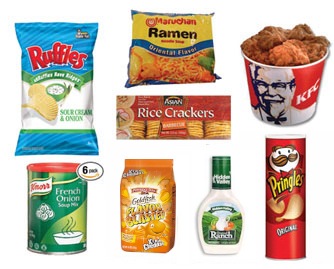
Figure
1. Products with MSG.1
Often
times, we choose to buy foods that taste delicious. If anyone actually cares to
look at food labels, you can find many ingredients that you may not know. One
of those ingredients could be monosodium glutamate (MSG). We always hear or see
"MSG" and know it's bad for you. Not many people know the full name
of the Chinese seasoning.2 The chemical can be found in foods
artificially and naturally.3 So it may be impossible to avoid MSG
intake because you might not know the full name or you didn't know that foods
contained a natural form of MSG.
For
most of the population, MSG has no effect whatsoever. People, who are affected
by MSG, usually get symptoms such as headaches, nausea, etc.4 For
those of you who have at least one of these symptoms after eating out at a
Chinese restaurant, you may have the Chinese Restaurant Syndrome.4
Chinese restaurants will most likely use the seasoning without you knowing,
until you feel sick from eating the food.
Many
studies have been done to compare whether or not MSG harms people. Some studies
present facts that if you don't have any symptoms, then you are safe. This
suggests that MSG is safe for you to use.5 If you do get any
symptoms as mentioned above, then try to stay away from artificially added MSG.
This is why others argue that the chemical isn't safe to use because it affects
our health.3
The
main point is that if you do use MSG, then try to use little as possible to
reduce the possible health risks. It's always better to be on the safe side
rather than regret later. Always read the label in case you do want to know
what you are eating.
1.
INK-CHROMA. The MSG Files, Part III: Umami.
https://inkchromatography.wordpress.com/2012/04/26/the-msg-files-part-iii-umami/
(accessed Oct 30, 2015). Copyright 2012 by INK-CHROMA. Reprinted with
permission.
2. Monosodium
Glutamate. In The Merck Index: An Encyclopedia of Chemicals, Drugs,
and Biologicals; O’ Neil,
M. J., Heckelman, P. E. Koch, C. B., Roman, K. J., Eds.; Merck & Co: Whitehouse
Station, NJ, 2006; pp 1080.
3.
Paullam. MSG: More Than Meets The Tongue. 2007. http://www.scq.ubc.ca/msg-
4.
Monosodium Glutamate. In Encyclopedia of Toxicology; Wexler, P.,
Anderson, B. D.,
De
Peyster, A., Gad, S. C., Hakkinen, P. J., Kamrin, M. A., Locey, B. J.,
Mehendale, H. M., Pope, C. N., Shugart, L. R., Eds.; Elsevier: Oxford, U. K.,
2005; pp 150-152.
5. U.S.
Food and Drug Administration. Questions and Answers on Monosodium
Glutamate (MSG),
2012. http://www.fda.gov/Food/IngredientsPackaging
Labeling/FoodAdditivesIngredients/ucm328728.htm (accessed Oct
23, 2015).
No comments:
Post a Comment